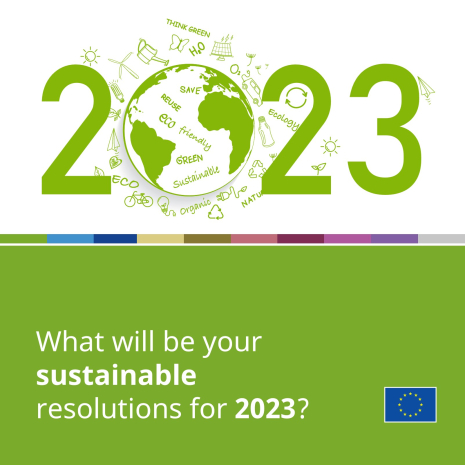What will be your sustainable resolutions for 2023?
Discussion
Information
13
Views
1
0
Comments
Discussion details
Created
02 December 2022

Through our professional or private life we can contribute to the planet’s well-being. Here are some ideas for your New Year's resolutions:
- Walk, bike or use public transport. Biking and walking are good for the environment, but also incredibly beneficial for the body and mind.
- Fly less and offset trips if you have to travel by plane. Carbon offsets give you the opportunity to invest in projects, like Trees Water People, DESPRI, or Aid Africa, that reduce your carbon emissions. To estimate your carbon footprint, use an online calculator.
- Slow fast fashion, looking for sustainably made clothes that will last or buying second hand clothes at a thrift store. Or challenge yourself in 2023 by adding nothing to your wardrobe.
- Be mindful of packaging. Reduce the amount of items you consume in packaging by using your own bags and buying from street and municipal markets or local farms. Less packaging means less waste, pollution and carbon emissions, but it also means less money - prices for heavily packaged items can sometimes be 50% higher.
- Cut water and energy use. Unplug electronics; skip the dryer; adjust thermostat settings to keep it at 20°C in the winter and 25°C in summer when you are awake, and turn them off while you are away and asleep; turn off the tap while brushing your teeth and be conscious of the water flow while washing dishes; think of making your garden more environmentally friendly by removing your lawn and replacing it with drought-tolerant plants, and, if possible, renovate your home to make it more energy efficient.
- Switch to non-toxic cleaning products for the sake of our water supply, air and our own health.
- Make your own compost, to be used in your home garden or by the municipality as organic fertilizer for growing plants, fruit trees or vegetables. This way you will contribute to reduce methane emissions, enhance the soil’s water retention, and more.
- Apply environmental sustainability and circularity criteria for procurement, taking into account the principles of the circular economy, the certification of forest products, organic products, as well as energy efficiency / low carbon and waste and pollution management.
- Learn and advocate. Continue learning about climate change and the state of our environment to be able to advocate for the issues. Check out the series of webinars offered by DG INTPA and DG NEAR and get involved.
For more tips to integrate environment and climate change into key development sectors, contact: INTPA-GREENING-FACILITY@ec.europa.eu | NEAR-GREENING-FACILITY@ec.europa.eu
Also, read the Quick tips to integrate environment and climate change into sectoral programming.

Log in with your EU Login account to post or comment on the platform.